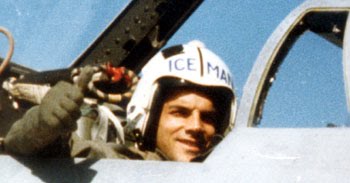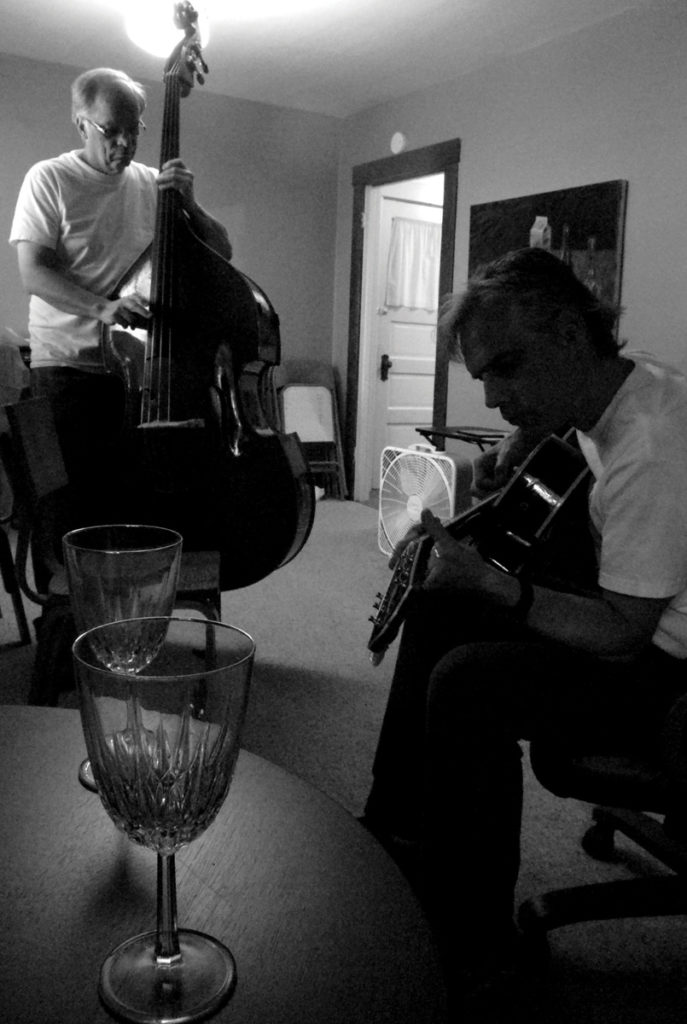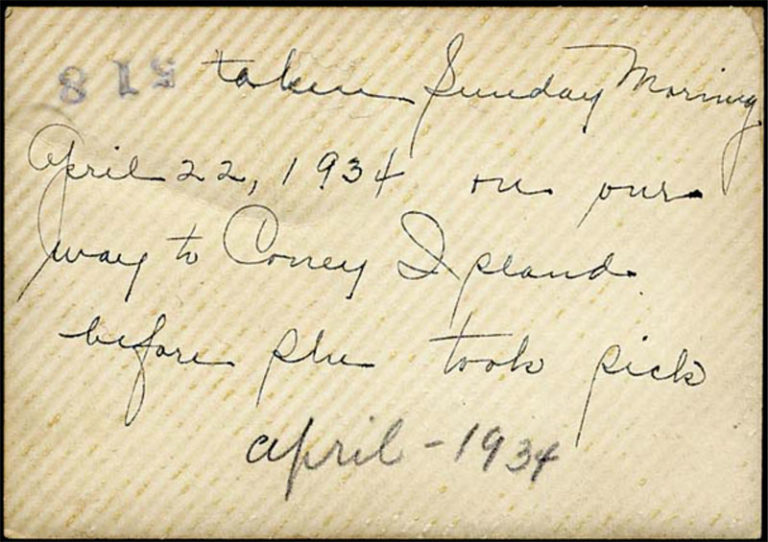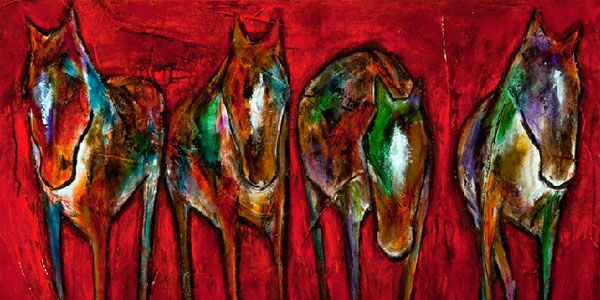Deniz Tek: Renaissance Man
Deniz Tek is ambidextrously inclined, as the right and left hemispheres of his brain control completely different enterprises: medicine and rock and roll.
One of the most influential musicians in Australian rock, Deniz is a modern renaissance man. He’s a Naval flight surgeon who specialized in emergency and aerospace medicine, an emergency room doctor who ran St. Vincent Healthcare’s Helicopter Emergency Lifesaving Program while also serving as the director of the ER from 1992 to 2002, and was named one of the top ten Australian guitarists of all time. His band—Radio Birdman—helped launch an entire movement of rock music across the sixth largest country in the world.
Deniz has balanced this timeshare over the years by segmenting his musical and medical lives. “I can’t do either full time, and I’m willing to sacrifice a little time from each to maintain both,” Deniz said in a recent phone interview. He doesn’t have an office practice, so he’s able to take time off from the ER without abandoning a patient to play music and tour.

Deniz brings ferocity to his music in the same way he brings intensity to the ER. He’s the original Iceman whose call name was immortalized by Val Kilmer in “Top Gun,” and he now splits his time between working emergency rooms in Sydney, touring internationally, and recording his music. He has dual citizenship in Australia and the U.S. and maintains a home in Billings, returning each year because there’s something enchanting about this little city that has kept up with the allure of Europe, Australia, and the Motor City, where Deniz first formed his legendary sound.
Australia-Bound
Deniz was raised in Ann Arbor, Michigan, an hour west of Detroit. His father was a first generation Turkish immigrant (Deniz is a Turkish given name), his mother an American. He grew up listening to early ‘60s surf rock and hot rod music. He was hooked on the Ventures, Phil Spector, and Dick Dale—all the music that was big before the British invaded.
“I was just learning to play the guitar and was really interested in that kind of music,” Deniz said.
Deniz began taking guitar lessons at age 12 and started his first band a year later, merging his early surf rock influences with the sounds coming from Detroit in the mid 70s, a gritty in-your-face workingman’s rock and roll.
Ann Arbor, with its particular mix of beatniks and artists, academics and hipsters living among industrial folk working in huge car factories and machine shops, was uniquely positioned to create high-octane rock and roll—a direct response to this blue-collar-meets-avant-garde scene.
Detroit was churning out bands such as MC5 and Ann Arbor replied with The Stooges, who laid a bass line of volatile rebellious rock that had never been heard before. Deniz recalled it being an incredible place for music, if only briefly.
“It was at the forefront of everything in those days—way ahead of L.A. and London.”
At age 18, Deniz took his Motor City musical background to Sydney, Australia, which had lingered in his memory since visiting five years earlier with his parents.
“Being near the ocean was a big deal, especially for a kid growing up in the Detroit area,” Deniz said. “I wanted to surf, to be out on my own and very far away from where I grew up.”
The roots of Deniz’s sound, all that high-energy rock and roll, was a new language in the land down under. Deniz took this fast and frantic Detroit rock sound and in 1974 formed Radio Birdman, a group long associated with the Australian punk rock movement, yet their sound—a kind of full-contact high-intensity rock—predated punk.
“Before ‘punk,’ they didn’t have a label for us,” Deniz said. “They didn’t know what we were. We were getting thrown out of gigs, and we only became acceptable because they could put a label on it and they could see there was some commercial viability to it. When punk actually hit, the only thing we had in common was the energy level involved and playing fast.”
Flew the Coop
In 1976, Radio Birdman was picked up by Sire Records and had evolved into a six-piece with keyboard and fairly complex song arrangements—a far cry from the gritty dissonance of the punk movements of the mid to late ‘70s. They launched out on a European tour with the Flamin’ Groovies, wrapping in mid 1978. They were slated to tour North America with the Ramones, which would have launched the band across the American music scene, but Sire Records filed for bankruptcy and dropped most of their bands, including Radio Birdman.
“We found ourselves without a label, without tour support, and with our album sitting in warehouses,” Deniz said. The group had no viable way to get their album in the hands of listeners, so in mid 1978 Radio Birdman wandered back to Australia, where the group dissolved.
“I think we were a better fit for America than the UK,” Deniz said. “Under another trajectory, things would have a lot different.”
Deniz moved back to the U.S. in the early ‘80s, after having been in Australia for 10 years, which is when he joined the Navy. In 1989, after fulfilling his tour of duty, Deniz started looking for a good place to raise his family. A position as an emergency room physician was open at St. Vincent Healthcare. “Billings seemed like a good place for my family, with low crime and clean air. And it was a good job opportunity for me. We showed up there without knowing anyone. It was November, the week before Thanksgiving, and it was already snowing hard.” Deniz laughs as he recalls his hot rod, which was completely useless in the snow.
A Billings Connection

Local musician and Yellowstone Public Radio DJ Ron Schuster brought Deniz into the Billings musical fold, asking Deniz to join his weekly radio program on YPR as the “Mr. E. Guest.”
“Deniz is a character,” Ron said, “One of the nicest guys you’d ever want to meet.” Ron introduced Deniz to fellow musicians Bob Brown and Pat Rogers, whom Ron jammed with at his house on the West End of Billings. “We all instantly became friends—still are,” said Bob.
Ron had a studio in his basement, and they started weekly jam sessions, writing songs under the name Zero House. “We were just a bunch of guys having fun,” Deniz recalled. “We did a variety of material, mostly playing covers, but I got the idea that I wanted to do an album myself—a solo album—so I used those guys to test out ideas.”
Deniz’s musical connections from Ann Arbor and Australia came through town to assist in this solo effort, and there was a period where Scott Asheton, one of the founding members of the Stooges, and the guitarist from Radio Birdman, Chris Masuak, hopped into the jam sessions.
“These guys reached a pinnacle with their band, traveled the world, and were recognized all over,” Ron said. “And here I am, a guy from Billings, Montana who barely plays guitar, jamming with them. It was a real ego boost for me. When you think about the Stooges, and the shit that those guys went through and have done, it was an honor to be in the same room.”
After a couple years writing and recording material, Deniz set off to Texas to master his solo album at Sugar Hill Records. Titled “Take it to the Vertical,” the album dropped in 1992 and has a song named “Me and Gene,” written by Ron about his time as a teenager driving the Montana Hi-Line and trying to pick up radio signals from Canada. A program about Gene Vincent came through the airwaves one night, and Ron was taken with the rockabilly founder.
After the release of “Take it to the Vertical,” Deniz launched an international tour to support the record. When the bassist dropped out of the tour without notice, Deniz called Bob and asked if he would join the tour. When Bob landed in Australia, Deniz was on the cover of the Asian/Pacific edition of Rolling Stone. But Bob knew Deniz in a different capacity: one of a dedicated ER doctor who gigged in a basement with Bob and his friends. “I’ve always known Deniz as Deniz,” said Bob.
“Bob and I work really well together,” Deniz said. “We understand each other, and he can tell where I’m going musically and help me get there.”
Channeling Detroit
 Deniz Tek’s latest solo recording, “Detroit,” was released earlier this year. He spent nearly two years working on the record in Billings, Bozeman, and Australia and recorded almost all the vocals in local musician Bob Brown’s home studio.
Deniz Tek’s latest solo recording, “Detroit,” was released earlier this year. He spent nearly two years working on the record in Billings, Bozeman, and Australia and recorded almost all the vocals in local musician Bob Brown’s home studio.
“Bob has this uncanny ability to produce vocals,” Deniz said. “He can tell me what’s needed, what’s not working. He knows when to say stop and knows when it was the right take. It’s an easy working relationship.”
“When we work, we work hard and we work long,” Bob said. “We have all developed over the years a process that just seems to work.”
“Detroit” is clean and minimalistic, like pounding back a shot of straight rock. “This album was designed to be stripped-down-straight-ahead rock and roll,” said Bob, whose driving bass lines arc through the record. Bob’s son, Steve Brown, is also credited on the album for his percussion work. Other Montana musicians on “Detroit” include keyboardist Ron Sanchez, who co-owns Bozeman’s Career Records with Deniz, and the English rock drummer Ric Parnell, who is perhaps best known for his role in the rock mockumentary “This is Spinal Tap” as the ill-fated drummer. He now lives in Missoula.
“It’s not like these gents are trying to imitate rock and roll; they are rock and roll.”
Pure, undistilled rock can be found at the white-hot center of “Detroit.” It’s not like these gents are trying to imitate rock and roll; they are rock and roll. Though the album was recorded in a collaborative effort, Bob credits Deniz with the final product. “We are part of a process of Deniz Tek doing what he does,” Bob said.
“Deniz is sharp and focused,” said Steve. “Whether he’s tearing open a chest or shredding on guitar, it’s the same intensity level. You’re in good hands if Deniz is taking care of you medically, and you’re in good hands when he’s taking care of you with rock. He is always on his game…and Deniz only has an A game.”
Tor as intense and exacting as Deniz is, he’s not a perfectionist. “If it’s good and he likes it—it’s good,” Steve said. “He doesn’t spend a lot of time going back and agonizing.”
“That’s perhaps the biggest influence on Steve and I,” Bob added. “Deniz will say that’s good enough, and then it’s done. He knows when to move on.”
A Billings Draw
Deniz’s story is a tremendous chain of musical happenstance and career choices that brought him to Billings 24 years ago. Though he works in Sydney and travels internationally for music, he maintains a home in Billings and returns at least once a year. “I have so many great memories of Billings,” he said. “What keeps me coming back are the people and relationships.”
Billings is a connected place to make music, one of open circles and freeform jams. It’s not the sexiest place in Montana, but there’s a collection of exceptionally talented musicians who choose to live and work in Billings. “People in other music communities tend to look down on Billings, which I think gives Billings people a sense of unity and solidarity,” Deniz said. Living in relative isolation, Billings has a DIY spirit that drives local musicians and provides a place for making music that is authentic and genuine.
“If anyone doesn’t like it—too bad,” Deniz said. “It means a lot more when it’s difficult to get.”






